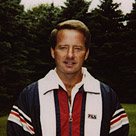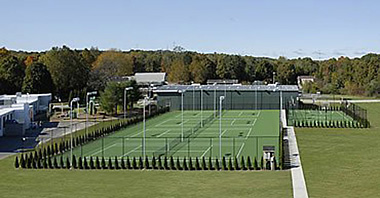Arias Tennis Wizard Three
Don't Be Fooled By The Trophies
 It's always fun to hear people talk about their tennis instructors because they inevitably gloat about what a great player they are or were:
It's always fun to hear people talk about their tennis instructors because they inevitably gloat about what a great player they are or were:
"Bob played # 1 for Florida State in 1977."
"Sam is ranked # 3 in New England in his age division."
"Betty had a win over someone who had a win over a player who went three sets with Chris Evert when Chrissie was 12."
While those are certainly all impressive accomplishments (except maybe the one about Chrissie), I say to those players, who cares? The fact that Rob, Bob or Betty might have a closet full of trophies, a boat load of newspaper clippings, or a serve the breaks the sound barrier has virtually nothing to do with whether that person is qualified to teach the game.
While a teaching pro certainly needs to have the technical skills to demonstrate the various techniques, feed the ball at different cadences and speeds, and hit at a level that can push his or her students, there are many other, much more important ingredients that go into the recipe that makes for a superb teaching professional. Here are a few:
Knowledge: I don't mean the latest rankings and most recent winner of the Utah Open (no offense Utah). I'm talking about an intricate knowledge of grips, movement, strokes, strategy and equipment.
A good teaching professional should know the advantages and disadvantages of the Eastern, Continental, semi-western and western grips as they relate to every shot in the game. They should be able to offer you different stroking options, explain the various footwork patterns and advise you on the latest rackets, shoes, strings and grips. Believe it or not, many super players really don't know a lot about these things, or they have been playing the game so long that the last time they thought about them was in 1969.
Communication skills: Knowledge is key but equally important is the teaching professional's ability to convey that knowledge to his or her students in an easy to understand, entertaining manner. People learn in different ways and a good teaching pro is able to figure out whether a student responds best to visual demonstrations or auditory instructions. This is not a skill that is learned at 5-5 in the third set. It is learned through training and spending hundreds of hours on the court with all different types of people.
Flexibility: There is no one tried and proven way to teach the game. Yes, there are certain fundamental things that all players do well (i.e., pickup the ball early, prepare their rackets quickly and move well) but students come in all shapes, sizes and ability. The good teaching professional realizes that trying to fit everyone into a "method" is like trying to stuff a basketball into a tennis ball can--impossible. Many great players will try to clone themselves through their students. The true professional has an approach to the game that he or she feels is the best and is able, and willing, to adjust that method to fit the student's needs and ability.
Patience: There is nothing more challenging than watching one of your students swing and miss, or miss-hit, ball after ball for sixty minutes. Think of fingernails being scraped down a backboard and you have the same effect that a teaching pro experiences when a student hits one ball after another off the side of their frame.
Though a struggling student can be frustrating for the instructor, the feeling is much worse for the student. The experienced pro knows this and is able, through encouraging and often joking comments to not only keep the student's spirits up but to also help them work through their difficulty. They are able to remember how difficult it was for them to learn the game and tell the student stories about how they struggled with the same shot when they first started.
Many great players lack this character trait as it relates to tennis. They've been playing the game for such a long time that hitting the ball has become like blinking their eyes-natural. It's often quite difficult for them to understand how someone can't hit the ball in the middle of the strings or execute a slice serve.
I've seen many a great player attempt to teach someone a shot and after a few minutes become disgusted with their students performance and impatiently say, "Here just watch me do it." It is said that patience is a virtue. For the tennis teaching professional it is as much a necessity as a racket and basket of balls.
Enthusiasm: As in any business, the good pros are there for more than the paycheck. They love what they do and you can feel it from the moment you walk on the court. They greet you with an eagerness and enthusiasm that's infectious.
Many "great" players are giving lessons only because they can't play anymore. They act as if teaching you is a chore and, unless you're a "promising" player, they have little interest. To the true pro, it doesn't matter if you're a tournament competitor or have difficulty putting one foot in front of another, the pro is equally eager to see you, help you improve and have a great time doing it.
It's all about the student. The pro is there for you and everything that he or she says and does must come from that perspective. The pro is not there to regale you with their stories of past greatness nor are they there to blow you off the court.
I've seen teaching pros actually get offended when one of their students hits a winning shot past them. Their (clearly shaky) ego is bruised--so what does the pro do on the next point? They blast a winner past the poor student and in the process remind them who's the boss. The pro also reminds the student who the idiot is.
A true professional's greatest wish is to have one of their students become good enough to beat them. That's their job and if a student becomes better than them, they've done that job well. When one of their players hits a winning shot past them, they cheer like that player has just won Wimbledon. They know how great the student feels having "beaten the pro" and they feel great for them. It's the student's turn to shine and the good pros know it.
There are thousands of great teaching professionals out there who have had very little, if any, success in tournament play (these "also-rans" often become the best instructors because they can truly emphasize with the trials and tribulations of the mortal player).
There are also great players teaching tennis who have no business doing so and, of course, there are great players who become great teachers. The fact is, for the vast majority of those taking lessons, their instructors tournament record is irrelevant.
Yes, if you are an elite player, it does help to have a pro that has "been there." Brad Gilbert is an excellent example of this. He's played Wimbledon, the U.S. Open etc. so he understands what it takes to win at that level. He also has an incredible understanding of the game's strategies and the ability to point out a player's strengths, weaknesses, and patterns. Would I trust him to teach a complete beginner, with limited athletic ability, who's not sure if they really want to play tennis? Not necessarily.
The point here is that, when you're looking for someone to teach you or your children, don't be blinded by the light shining off a person's trophies. Do your research and make certain that the person you are considering has the knowledge, the communication and emotional skills and, most important, the desire to help you.
This column is copyright 2004 by Greg Moran, all rights reserved.
Greg Moran is the Head Professional at the Four Seasons Racquet Club in Wilton, Connecticut. He is a former ranked junior and college player and certified by both the USPTA and USPTR. Greg has written on a wide variety of tennis-related subjects for numerous newspapers and tennis publications including Tennis, Tennis Match and Court Time magazines. He is also a member of the FILA and WILSON Advisory Staffs.
You can find more articles like this to help your tennis game by going to www.tennisserver.com .
Send your questions to the
< Previous | Return To Wizard Home | Next >
Programs

The SCJTL Summer Tennis League an inclusive “playing” experience for all junior tennis participants. Since 1997 the SCJTL Summer Tennis League has offered all participants the opportunity to play on teams on a league that emphasizes fun, fitness and friends.
Tennis Lessons
![]() Joe Arias is available for a full range of tennis lessons and personal coaching services. Private and group lessons for all ages and levels. Specialist in tennis biomechanics corrections and improvements, game style enhancement, singles and oubles training .
Joe Arias is available for a full range of tennis lessons and personal coaching services. Private and group lessons for all ages and levels. Specialist in tennis biomechanics corrections and improvements, game style enhancement, singles and oubles training .
Find Out More About Tennis Lessons
SCJTL Training Centers

The SCJTL Training Centers are learning and skill development facilities. Kids and adults learn and improve tennis skills thru SCJTL Personal Coaching Services and SCJT Player Development programs.
Find Out More About SCJTL Training Center
SCTEF
 Suffolk County Tennis and Education Foundation, Inc. (SCTEF) is a New York State, non profit corporation and Federal 501(c)(3) created in 2003, with the purpose of providing athletic, educational and charitable activities to all Suffolk County residents regardless of age, ability or socio-economic status.
Suffolk County Tennis and Education Foundation, Inc. (SCTEF) is a New York State, non profit corporation and Federal 501(c)(3) created in 2003, with the purpose of providing athletic, educational and charitable activities to all Suffolk County residents regardless of age, ability or socio-economic status.

